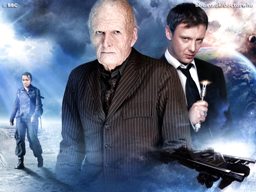 After five solid weeks of “Doctor Who” I suppose there was going to be an episode that was a let down eventually. It’s just too bad that episode turned out to be the season finale of series three, “Last of the Time Lords.”
After five solid weeks of “Doctor Who” I suppose there was going to be an episode that was a let down eventually. It’s just too bad that episode turned out to be the season finale of series three, “Last of the Time Lords.”
Looking at the entire three-part season finale in the context of being a six-part story from the classic “Who” days, it’s easy to see some similiar patterns. One common criticism of six part stories is that in episode five, not a lot really happens to advance the plot. And looking at the first half of “Last of the Time Lords” you could make that same criticism here. Because for a solid 25 minutes of the storyline, not a whole lot happens.
SPOILERS:
The story begins, flashing forward a year and giving us hints of what Martha has been up to. She’s been travelling the globe, looking for a weapon that will kill the Master. It’s apparently some device that has four vials of fluid that when combined and injected into the Master will kill a Time Lord. The research for it came from old UNIT files and Torchwood. It’s an interesting idea, I suppose, but if there’s one thing UNIT should have learned, it’s that the Master is very careful of those he allows close to him. Seems to me this weapon isn’t the best way to take out a Time Lord, so when it turns out to be a red herring, I wasn’t terribly shocked.
Meanwhile, the Doctor, Jack and Martha’s entire family are being held prisoner on board the air ship from last week. The Doctor is still in his older state from last week and is brought out occasionally by the Master to gloat. The Master has decided to build up Earth’s war machine to serve as an attack force on the rest of the universe. He will declare war and usher in a new Gallifrey with the help of the Toclafane.
And then, the Doctor and everyone tries to take out the Master, only to see the plan fail. Honestly, I can’t see why it took a year for them to come up with this plan, unless it was part of the overall plan the Doctor had to defeat the Master. Though how it ties in, I’m still a bit sketchy on — maybe it will become clear as I watch this episode a few dozen more times in the years ahead. The Master uses his laser screwdriver to age the Doctor again, putting all of the Doctor’s years on him and turning off his ability to regenerate (this will be important later). The Doctor becomes a small, withered little character who is kept in a bird cage.
It’s at this point the pacing and story derail a bit. Nothing much of interest happens for a long stretch of the story, except the Master gloating and his wife looking more and more like an addict on a bad binge. Once again, my big issues with Russell T. Davies stories comes into play — he’s got some good ideas here, but he really doesn’t bother to explore them. I really am interested in why the Master’s wife looks so pale and withdrawn, but we never get any reasoning for it. Or why the Master married her or what purpose she serves in his master plan (no pun intended)? Does he want to father a new race of Time Lords with her? Could this being, who is half-human, somehow be used to tie into the TV movie? So many ideas, so many good ideas, so few of them explored.
At this point, as I’m beginning to become frustrated with my favorite show, things finally begin to happen. It’s almost as if the words “episode six” appeared on screen and now we have to race to the finish line to pay off all the storylines we have in place.
The final half of the story almost redeems the episode as whole. For one thing, as pay-offs to season-long story arcs come into play, it actually feels natural and not forced. Davies even goes so far as to give some payoffs to story arcs from the entire series, making the final half of the story feel like he’s saying farewell to the series and is stepping aside. And I will give the script credit — for the most part, I like the way all the pay-offs play out.
Davies script writing here is more assured and gives me hope for future installments. He reveals who the Toclafane really are and I have to admit, it worked. It ties in two dangling plot threads from part one and two in a satisfying manner. (The Toclafane are the human colonists from “Unity” and their ability to come back in time and conquer Earth is because of the TARDIS being a paradox machine from part two). Meanwhile, the Doctor is able to heal himself through the combined good will of the population of the Earth. He’s timed his resurrection to the launch of the weapons to start the war, thus defeating the Master completely and with no chance to rebuild or escape. If you thought the TV Movie was full of Christ-figure overtones for the good Doctor, it’s nothing compared to what we get here. The Doctor’s healing and reverting back to his old self is a nice moment (he ties into the Master’s satellite network and reverses it to help the good thoughts restore him, which explains why no one bothered to take it out) for the show.
Then, there is a final confronation between the Master and the Doctor. The Doctor decides he will hold the Master prisoner in the TARDIS and try to rehabilitate him. Well, that is until the wife shoots the Master and he refuses to re-generate. Apparently, Gallifreyans can hold back a re-generation and die if they want. It’s never been estabished by the continuity before, but then again it’s never been refuted by previous continuity.
And the Master dies in the Doctor’s arms and is burned on a funeral pyre. Or so we’re lead to believe. A female hand comes in at the end and steals his ring–so the Master could be back in the future. Possibly as Mrs. Saxon….(she’s probably cheaper to use on the show than John Simms).
For the most part, all of this works well and it enjoyable. It’s just too bad all this good material is overshadowed by the giant reset button ending. After closing the paradox machine, the world moves back a year and resets itself–but no one recalls it except those on the ship. I guess after all those years of reset button endings on “Star Trek” it kind of stinks to see it incorporated here. I am glad that at least Martha and her family remember it all, but it still felt like Davies painted himself into a corner and didn’t know how else to get out of the situation. (Also, we’ve seen so many one year jumps on shows of late, that it seems like the SF flavor of the moment.)
I wanted to love this episode. I desparately wanted to love it. But coming away from it, I have to admit I’m unsatisfied. It did some good things–maybe even some great things. But it also had some pacing issues and a deux ex machina ending that stuck out like sore thumbs. I think a lot of this is because of the writer that is Russell T. Davies. Davies seems to go for things that make for good television moments and work better in small clips (last year’s season finale trailer was better than the two-part season finale in my opinion) but yet as a cohesive whole, it never adds up. Which is exactly what seems to be happening here. I’d like to say this problem is more because of it being the end of the season and Davies is busy with all his duties as producer, but with the exeption of “Gridlock” this has been an issue in all of his scripts on the show.
Also, there are a lot of wasted opportunities. Looking back, John Barrowman is totally wasted on the three parts he’s in this year. He does very little this episode except be held prisoner. We do get a huge reveal of his nickname and Davies puts in that Jack can age but he won’t die, thus ensuring Jack can continue to be in Torchwood and look older (and thus not falling into the trap of shows like “Angel” with ageless characters played by actors who age). Let me say that I do like the reveal of Jack’s nickname and the implications for the series as a whole. I won’t reveal it here, but it’s a nice touch.
Also, while I don’t necessarily want extended scenes of her family such as we got with Rose, I feel as though we never got to know much about Martha’s family. We should care about them and their being held prisoner and forced to be slaves for the Master…but I don’t have any investment in the characters, beyond the fact they are familiar faces. Had it been Jackie and Micky held prisoner and forced to be virtual slaves to the Master, I would have cared far more if they lived or died in their attempt to overthrow him. I think this is a weakness of the season as a whole (one of the few).
And so, we come to the end of series three. I wanted it to end with a bang, but it sort of ended with more of a thud. Like I said, some good parts to the story, but some of the usual mistakes that a Russell T. Davies script makes. I wanted to love it more than I did. I liked it but I’m still not entirely satisfied.
That said, it wont’ ruin my overall positive feeling for the season and classifying it as the best season the new show has produced.
Series three set a high standard. Let’s hope series four clears the bar and goes even higher.
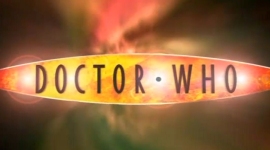
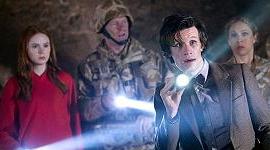
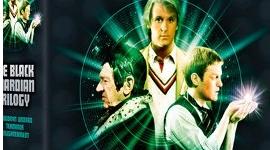
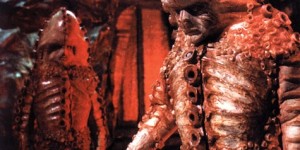

I think this season was really well done. I have to say I too was disappointed in the season finale.
Can someone more versed in Whovian lore explain to my how the doctor can be healed by the ‘goodwill of the people of earth’. WTF is that? Is there some reference to something established in the back story of Who continuity I’m just not up on? (I only started watching Dr Who with this series). If not, then IMHO that is LAME.
I also cant stand ‘reset button’ endings, but since the show is all about time travel, I suppose I can let that slide.
According to the audio commentary available on the website, the version broadcast last saturday is longer than the one that will appear in the USA.
I concur with this review. The first half of the episode was really messy, but it did draw together towards the end. It suffered a bit from ‘finale-itis’ in attempting to tie up too many plot threads, while at the same time introducing other stuff, which made for a good deal of confusion.
As for it being messianic — this I think we should expect. The Doctor is often portrayed as a kind of Saviour, after all.
I would like to be a dissenting voice here and say that I enjoyed the whole three part story. I saved up the previous to episodes so that I could watch the whole thing in a single sitting, so perhaps I was riding the wave of the previous two parts. Yes the pacing at the start of part three was a little slow, but coming off the end of part two, I was kind of expecting it, so I wasn’t too put off.
Also, I am a big fan of continuity in my shows, so I was especially gratified to see so many elements of previous episodes brought into play, both within the three part storyline, and from without. All in all, I did not walk away from this one disappointed – except to realise that the Christmas episode is such a long way off.
It didn’t take a year to come up with the plan, it took a year for The Doctor to telepathically sync up with the satellite signals, which he indicates.
The purpose of The Master’s wife is, I think, exactly what we saw: she was to shoot The Master if it was clear that he’d been defeated, in order to both crush The Doctor’s spirit, and in order to escape. It all seemed planned-out to me, and served its purpose well. After all, The Master has to have become pretty accustomed to losing to The Doctor by now.
As a Who fan who is steeped in the continuity, there is no precedent for the Doctor’s magic healing that occurred here. I guess if the Master can find a way to use the satellite network to impose his will, then the Doctor could find a way to reverse it to use the goodwill of the people to heal and rejuvinate himself. And if you look at it as the Doctor and the Master being two sides of a coin, it does sort of make some kind of sense in a way….but not really.
I have to admit I’m not shocked it will be cut down for American viewing. I’d love SciFi to run it in an hour and a half time slot or do like FX does for The Shield and just run late….but they won’t. But we can lose bits of the Master tormenting the Doctor in a cage and not lose too much…but I’m not sure you will find ten minutes to cut there…
Firts 1/2 very good, but there were a few parts I found disappointing / depressing.
– The Toclafane being revealed as Humans (Very depressing, I know it’s a show, but it gave no hope for the human race).
– Everything resetting, you would of thought the people on the ship would be a bit more depressed / shocked at what they saw over that year.
– Capt Jack is the Face of Boe??? (that possibley would be depressing for Jack actually)
And the various movie rippoffs. Looking back at the over 2 season finals, (Daleks and Cybermen), I would say Good, but not Very Good.
Here I go again and I can’t help myself….I Hate Russell T Davies writing. I mean what the heck… All of a sudden if we pray to the doctor he gets Peter Pan powers of flight and able to heal and stop laser beams. I don’t care if he took 7 year to hook up to the psychic network…this is poor writing at its best. What’s next he’s gonna pull out a transparent “S” from his chest and knock down the Master alla superman 2…sheesh…My 2 cents..
I have been following the fan reaction to the season finale on both here and on various Who forums and podcasts. So far the fan anguish seems to be over a few specific points that annoyed people so much they soured the whole experience:
1 One year later – For some reason, lots of people (especially on Podshock, or was it DWO Whocast?) are deeply troubled by the time jump. Why? Granted BSG did it too, but according to RTD this was planned before that. Setting Last of the Time Lords one year later allowed for Martha to be grown as a character in a way that made sense and was dramatically satisfying. It also provided sufficient time for the Doctor’s plan to come to fruition and for us to see how the Master would run the world – as a horrific and bloody Tyrant (without having to actually show the brutality, which would have been inappropriate for a family show).
2 Gollum Doctor – For some people, it seems that having the Doctor be made to look like Dobby the House Elf or Gollum from LOTR was just a little much. OK, maybe it wasn’t RTD’s best idea, but I think it worked. It was a way of truly humiliating the Doctor and making everything look bleak and hopeless at seeing the Doctor in such a sorry state before bringing him back to his full self to even greater effect. For those who were distressed by seeing the Doctor in such a state, that was the point. Why would a 900 year old Doctor look like that. Well, I’m not entirely sure, but we all know people shrink when they get older, so I guess that was what they were going for, as well as taking the metaphor of diminishing the Doctor to its logical conclusion. Also it may have been a fan reference to the Master’s tissue comression eliminator from the classic series. Oh and the suit. While I agree with those who say it seems far fetched that the Doctor’s little suit would regenerate with him, the fact that he had it makes perfect sense. It is literally the Master’s little joke to treat the diminished Doctor like a pet or a doll to dress up.
3 As for the regeneration of the Doctor and the superpowers given him by saying his name, I really don’t see a problem, even without religious/mystical explanations. True, the timing element was a huge plot hole (how did they know exactly when to tell people to say the name. But everything else made sense within the “scientific” explanations already set out in the series previously. It was already established that words could be used like numbers for scientific purpose and effect in the Shakepeare code, and frankly that “science” made as much sense as anything else in the series scientifically.
And for those who don’t really buy the whole “words have power” thing, the word wasn’t really the point. Martha didn’t just spread a word but a story – the story of the great and powerful Doctor. What had power through the Archangel network was not just the word “Doctor” but the hopes, feelings and psychic power of so many people focusing on the Doctor at one time. That’s why the Doctor is restored – because the psychic energy channeled through the network “sees” him as powerful and potent. And that’s why, for a brief time, the Doctor is able to do the superheroics – beause that is the image in peoples’ minds chanelled through Archangel, if only briefly.
At least, Ithink that’s what RTD had in mind, and its true that perhaps another line could have been added to explain it a little better.
4 Jack = the Face of Boe -Oh come on that was cute! The idea of the vain Jack becoming the wrinkled bodiless Face of Boe is just too precious and too good an oportunity to pass up. Worth it just for the look on the Doctor and Martha’s faces.
There are probably more things but these seem to be the main ones. Certainly this was not a perfect episode by far but certainly it (and RTD, who let us remember brought this wonderful series back, so cut him some slack) but it was a lot of fun and I think it was internally consistent, if not very realistic – but then Doctor who isn’t a realistic show.
ok. Realistic may not be required.
But I didn’t like ‘super Rose’ back in series one. And the ‘Super Doctor’ here dissapointed me. I also never like ‘undo the last xxxx period’ solutions. I didn’t like it in Superman. I didn’t like it here. (ok… I didn’t mind it in that Quantum Leap episode…. But I have always been more forgiving to that show).
How did The Doctor fix hs TARDIS so fast? The Master had, well, as long as he wanted. He could have gone back to the end of the universe and had a few years to fix it. The Doctor fixes t in few days at most. How does that work?
What has happened to the few spheres that came back with The Master (seen in Part 2 before the rift opened)?. I think they will be back.
How come Captain Jack was able to destroy the Paradox Machine in part 3, when in part 2 they were told that undoing the wrong thing could destroy the solar system? (ok…. it was now active, so that may have made a difference).
And he’s still not dead. 🙂
PfA.
I’d like to add something to the use of Mrs. Lucy Saxon.
In “The Keeper of Traken”, the dying Master took over the body of companion Nyssa’s father, killing him and becoming portrayed by Anthony Ainley until the series first end at “Survival.”
Then in the TV movie, the Master took over a paramedic and became Eric Roberts.
So the precedent is well set–the Master was keeping Lucy so he could use her body to escape. The next time we see The Master, she’ll be The Mistress. 🙂
In the podcast/commentary, RTD said that the hand picking up the Master’s ring was added at the last minute, purely to give future Doctor Who producers a way to bring the Master back. There are no plans to bring the Master back in series 4.
(unless that is just misdirection)
Ive been thinking about this since my 1st post (top of the forum) and I guess the biggest problem I have with these episodes was the whole ‘reset’ thing.
I mean, at some point in “Last of the Time Lords” I said to myself that they’re going to *have to* reset this. Too much had happened that anything short of a big huge reset button wouldn’t fix it. And TV mostly takes the easy way out.
If they took the ‘hard way’ out and left present day earth in the state it was in at the end of the episode, I think I would have had a whole diff opinion on this one.
That would take guts and smart writing in future dealings with earth, but would give the audience the impression that anything can happen and nothing is safe. It would be interesting to deal with the aftermath of all that from the human perspective as well.
Oh well.
I was just finally able to find the time to watch this last night after being gone during the airing of the final episode.
The Face of Boe was pretty entertaining, but in that entire episode that was about it. While it wrapped up everything nicely and set the stage for the Christmas special I can’t help feeling a bit of a let down for a lot of the reasons mentioned in the review itself.
While glad to see the year reset due to the amount of calamity caused at the same time it kinda left some weirdness behind with Martha & her family being scarred from the experience. Since we don’t know the family very well other than what was shown in a few of the earlier episodes it appears that the parents reconciled through their shared experience, but little sister sure seemed scarred when they were talking about who would kill the Master first.
Overall still a great season, but sometimes I think it’s hard to build and build and build and then answer everything in 51 minutes.
Alan! Great thinking! I think even if RTD didn’t think of it when writing it, I think your idea was -as the 9th doctor would say – fantastic! The Master next time will be a woman!
I hated the way RTD wanted us to feel sorry for the Master-
a ruthless tyrant who killed millions of people.Everyone was
supposed to feel sad when he died-even though he’d murdered
and enslaved almost everyone.
This episode made the Doctor look so weak that no-one
could take him seriously as a hero. First we have him aged,
then shrunk, and finally “forgiving” his enemy. The episode
was full of bad plotting (I hated the way the President died
and no-one remembered when everything went back to normal)
I think RTD should just stop writing scripts and stick to
being the producer.